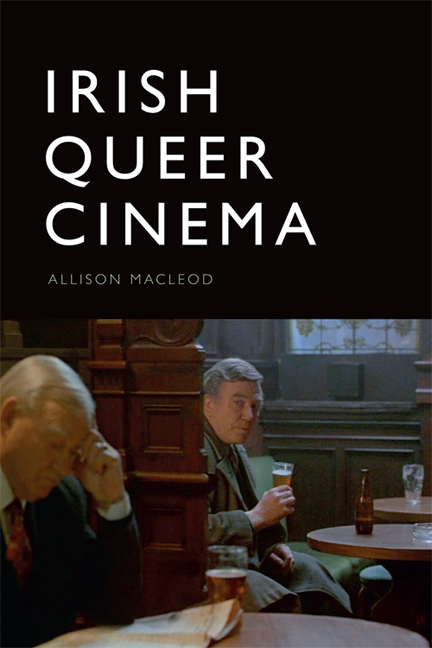Book contents
- Frontmatter
- Contents
- List of Figures
- Acknowledgements
- 1 Queerly National and Nationally Queer: Paradoxes of an Irish Queer Cinema
- 2 Mapping Ireland’s Queer Films
- 3 Re-imagined Kinship and Failed Communities
- 4 The Contested Space of the Irish Pub
- 5 Compartmentalised Cosmopolitans and Rigid Fluidity
- 6 The Queerly Productive Constraints of Rural Space
- 7 Queer Mobilities and Disassociated Masculinities
- 8 Contested Belongings within Diasporic Space
- 9 The Irish Queer Short Film
- 10 Concluding Remarks
- Select Filmography
- Bibliography
- Index
9 - The Irish Queer Short Film
Published online by Cambridge University Press: 04 May 2021
- Frontmatter
- Contents
- List of Figures
- Acknowledgements
- 1 Queerly National and Nationally Queer: Paradoxes of an Irish Queer Cinema
- 2 Mapping Ireland’s Queer Films
- 3 Re-imagined Kinship and Failed Communities
- 4 The Contested Space of the Irish Pub
- 5 Compartmentalised Cosmopolitans and Rigid Fluidity
- 6 The Queerly Productive Constraints of Rural Space
- 7 Queer Mobilities and Disassociated Masculinities
- 8 Contested Belongings within Diasporic Space
- 9 The Irish Queer Short Film
- 10 Concluding Remarks
- Select Filmography
- Bibliography
- Index
Summary
This chapter concludes this study of Irish queer cinema by focusing on the queer potential of the Irish short film. The short film has played a crucial role in the development of an indigenous film culture in Ireland. While the IFB's closure in 1987 led to a marked decline in the production of feature films, there was a sharp increase in the number of short film productions from 1987 to 1993. In contrast to the two Irish shorts produced in 1986, there were 13 productions in 1987 and 30 productions in 1993 (Monahan 2009: 87). Shorts were viewed as a film practice that allowed filmmakers to retain a public profile and develop their filmmaking skills despite a lack of State funding. They further became a means for the Irish film community as a whole to maintain its cultural visibility and train new filmmakers. During this period two colleges, Dun Laoghaire School of Art and Design and the College of Commerce, Rathmines (now part of the Dublin Institute of Technology) offered filmmaking courses. As a result, many filmmakers associated with this early wave of short filmmaking emerged from art college or film school backgrounds and approached film as an artistic endeavour rather than a commercial practice.
Short film production in Ireland has also been critical to the development of an Irish queer cinema. Both Lance Pettitt (1997) and Martin McLoone (2000) have argued for the short film as an arena where LGBTQ struggles have been documented. Less costly to produce with a quicker production cycle than the feature-length film, the short film is a medium available to filmmakers with precarious resources. The temporal limitations of the medium also provide new narrative and aesthetic possibilities. For instance, Ruth Barton considers how short films are ‘more fluid in the construction and less dependent on the three-act structure still widely favoured by Hollywood and non-Hollywood practitioners alike’ (2007: 154). Building on Barton's argument, Barry Monahan (2009) claims that shorts are not only less dependent on the traditional narrative structure but inherent in the form is an awareness of its spatial and temporal limitations. Subsequently, the short film must place a particular emphasis on the visual or what Monahan terms ‘visual density’: ‘a stylistic and visceral condensation that occurs within the more restricted form’ (2009: 95).
- Type
- Chapter
- Information
- Irish Queer Cinema , pp. 146 - 159Publisher: Edinburgh University PressPrint publication year: 2018



